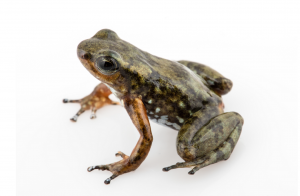A Constitutional Protection Action win at the Cotacachi Court on September 24 may stop mining companies destroying the habitats of endemic species in Ecuador

“In a huge win for the environment, on Thursday 24 September a judge at the Cotacachi Court ruled that the Ministry of the Environment failed at its job of protecting species on the Llurimagua mining concession in northwestern Ecuador’s biodiverse cloud forests. The case has implications for mining companies operating throughout Ecuador,” says Rebekah Hayden, a member of the Rainforest Action Group, an environmental research and advocacy group.
The Constitutional Injunction (Medidas Cautelares) was brought to the Cotacachi court in late August to immediately stop the Llurimagua copper mining project. The case argued that extractive activities in all habitats where endemic species are found should be prohibited.
“Two endemic species of frogs are threatened by the Llurimagua mining project: the Longnose Harlequin Frog and the Confusing Rocket Frog. The case was put forward by environmental and community groups DECOIN, GARN, CEDENMA and the Jambatu Centre. More than three dozen other species including several bird species, two species of monkeys, and the spectacled bear are also in danger of extinction from the mining project,” says Carlos Zorilla, a founder of DECOIN.
The team presented several expert testimonies, including Ecuador's best-known herpetologist Juan Manuel Guayasamin and Amicus Curiae (Friends of the Court) from mammal biologist Professor Diego Tirira, University of Sussex biologist Mika Peck, and lawyers from Ecuador’s Ombudsman’s office, Nature Rights expert Natalia Greene, among others.
“The Llurimagua copper mining project is being jointly developed by Ecuadorian state miner ENAMI and Chile giant Codelco in an extraordinarily biodiverse region. However, community resistance, a highly flawed environmental impact study and conflict between the two companies over how to split the profits, means there hasn’t been any exploration on the site since 2018. Aussie companies BHP and Hanrine (a subsidiary of Gina Rinehart’s Hancock Prospecting) are contenders to buy ENAMI’s share, with the sale expected to happen in the next few months,” says Rebekah Hayden.
The court ruled in favour of the Rights of Nature over the economic rights of the mining companies, giving the respondents - the Ministry of Environment and the Attorney General - three months to remedy the illegalities and irregularities detected in the first stage of exploration. This process will be overseen by a number of civil society groups, including universities.
“The judge ruled that if the government can’t show they can adequately protect these species from extinction, the mining permits will be revoked. This ruling also indicates that similar cases to protect other endemic species around Ecuador may succeed in the courts. Given Ecuador’s high rate of endemism, it could stop a large part of the country from being mined,” says Carlos Zorrilla.
The government has said it will appeal the decision, but the Rights of Nature team are confident they are more likely to win at a higher court.
“We are prepared to take the case all the way to the Supreme Court, as we feel there is indisputable evidence that mining in Intag’s forests will violate the Rights of Nature,” Carlos Zorrilla says.
The prospect of a lengthy court case, particularly when Rights of Nature are such an important part of the Ecuadorian Constitution may affect BHP and Hanrine’s decision to invest in the project.
The Imbabura Province where Llurimagua is situated has been a hotbed of conflict since the early 1990s, with two mining companies forced out since then.
“With BHP emerging as a likely contender to buy out ENAMI, and their standstill agreement with SolGold expiring in October, allowing it to make a bid on the company, a winning bid for both SolGold and ENAMI’s share of Llurimagua would give BHP the largest number of concessions in the region, and increase its holdings across Ecuador to over 300,000 hectares,” says Rebekah Hayden.
“The case for the rights of endemic species could make it a very bad investment for BHP if they go ahead with these bids,” says Rebekah Hayden.
FOR MORE INFORMATION, CONTACT:
Carlos Zorrilla toisan06@gmail.com
(DECOIN)
Centro Jambatu andreateran84@gmail.com
Natalia Greene secretariat@therightsofnature.org, presidencia@cedenma.org
(GARN, CEDENMA)
Visit: www.decoin.org
Intag Santuario de Vida Facebook
For additional information about the frogs see:
https://bit.ly/331VNUf and https://bit.ly/307I2kV
Full media release here.
